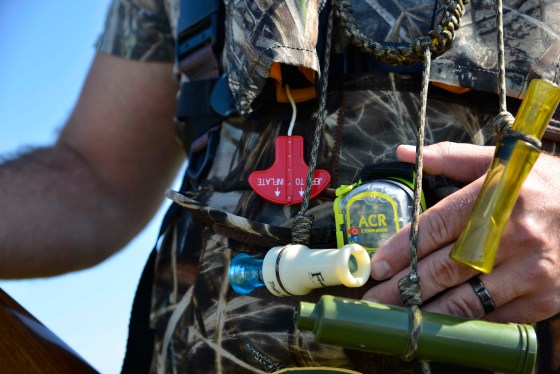 Coast Guard Petty Officer 2nd Class Aaron Baker, an avid duck hunter, demonstrates proper hunting safety gear near Wachapreague, Va., Sept. 26, 2016. Baker's personal floatation device and personal locator beacon do not interfere with his hunt, and just might save his life. U.S. Coast Guard photo by Petty Officer 2nd Class Nate Littlejohn.
Coast Guard Petty Officer 2nd Class Aaron Baker, an avid duck hunter, demonstrates proper hunting safety gear near Wachapreague, Va., Sept. 26, 2016. Baker's personal floatation device and personal locator beacon do not interfere with his hunt, and just might save his life. U.S. Coast Guard photo by Petty Officer 2nd Class Nate Littlejohn.
As water temperatures continue to dip, the U.S. Coast Guard is urging all sportsman enjoying the hunting season along the Mid-Atlantic coastline to do so responsibility.
Watchstanders from the U.S. Coast Guard Atlantic City Air Station recently rescued two duck hunters near Brigantine. They discovered the hunters with only one bottle of water, no food and cell phones with little charge left. The air temperature was close to freezing and the sun was setting. The aircrew hoisted the two hunters and brought them safely back to the air station.
The average water temperature for coastal waters from New Jersey to North Carolina is 46 degrees, which can cause a loss of muscle control and possible unconsciousness within an hour of exposure according to the National Weather Service.
The U.S. Coast Guard urges all boaters to be properly prepared before heading out on the water regardless of time of year. The difference and the challenge with these colder months is the inherent danger presented by the dropping water temperatures.
Before heading out on your trip:
- Take a boating safety course with the Coast Guard Auxiliary.
- Use the Coast Guard mobile application to file a float plan.
- Leave your float plan with a friend or relative.
- Include a description of your boat and equipment name, names of passengers, planned destination and route, expected return and when and who to call if overdue.
- Family members should not hesitate to contact the Coast Guard once boaters have surpassed their planned return time and can't be reached. Timely notification is crucial and key in how long boaters are exposed to the harsh elements
- Check the forecasted marine weather prior to getting underway.
- Compare the expected sea state (wind and wave heights) to the capabilities of your vessel.
- Dress appropriately for the water temperature, because cold water lowers body heat dramatically faster than cold air. Even if you are not planning on entering the water, the possibility of that happening is very real. An unexpected fall overboard is one of the leading factors in boating deaths.
- Acquaint yourself with the area.
- Make sure the boat has enough fuel.
- Hunt with a companion or group, staying within visual or voice contact. Boating safety increases with numbers.
- Maintain safety gear onboard your vessel.
 Coast Guard Petty Officer 2nd Class Aaron Baker, an avid duck hunter, demonstrates proper hunting safety gear near Wachapreague, Va., Sept. 26, 2016. Baker's personal floatation device and personal locator beacon do not interfere with his hunt, and just might save his life. U.S. Coast Guard photo by Petty Officer 2nd Class Nate Littlejohn.
Coast Guard Petty Officer 2nd Class Aaron Baker, an avid duck hunter, demonstrates proper hunting safety gear near Wachapreague, Va., Sept. 26, 2016. Baker's personal floatation device and personal locator beacon do not interfere with his hunt, and just might save his life. U.S. Coast Guard photo by Petty Officer 2nd Class Nate Littlejohn.